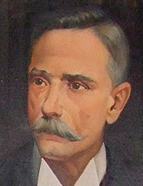

Jurist, magistrate, politician , and historian, a key figure in our historiography at the turn of the 20 th century. Born in Lisbon, HGB studied Law at the University of Coimbra between 1848 and 1853. Professionally, he practised law (1855-57) and was also Administrator of the municipality of Sintra (1857-62), Neighbourhood Administrator in Lisbon (1862-69) , and Secretary of the Civil Government of the Capital, holding the title of Civil Governor on two occasions (1876-77 and 1878-79). A member of the Supreme Administrative Court between 1877 and 1879, he became a Counsellor of the Court of Auditors in the same year, presiding over it from 1900 to 1910. The final years of the Monarchy saw him briefly become involved in politics as a supporter of João Franco and the Partido Regenerador-Liberal [Regenerative-Liberal Party] , being appointed Peer of the Realm in 1906. With the proclamation of the Republic, he ceased all professional activity and political intervention.
As a jurist by training and a magistrate by profession, HGB made his ‘literary’ debut in 1860 with a compilation of the administrative law of his time. This work ( Reportório Administrativo …[Administrative Repertoire] ) is usually considered the starting point for the project of a ‘General History of Administration’, which would deal with the background to the 1842 Code. In other words, HGB would present himself from the outset as a jurist who ‘made History’, writing a preamble to a treatise on ‘Portuguese Administrative Law’ (which would result from the expanded re-edition of the 1860 book), and not as a historian tout court . However, the completion of the work (of which the 12 th and 15 th centuries were only the first of three periods to be dealt with) ended up revealing the historian, and particularly the medievalist. Generationally close to authors such as Henry Thomas Buckle (1821-1862), Ernest Renan (1823-1892), Hippolyte Taine (1828-1893), Theodor Mommsen (1817-1903) , and Numa-Denis Fustel de Coulanges (1830-1889), particularly influenced by the latter, HGB can be included in a ‘constitutionalist’ h istoriography of p ublic l aw, with European representatives in Georg Waitz (1913-1886), William Stubbs (1825-1891), Frederick Pollock (1845-1937), Frederick William Maitland (1850-1906) , and Eduardo de Hinojosa (1852-1919).
1 Text from the 1990s, prepared as an entry for a Dictionary that never came to fruition. Updates HOMEM, Armando Luís de Carvalho - ‘Gama Barros, historiador das instituições administrativas (No I Centenário do início da publicação da “Historia da Administração Publica em Portugal nos seculos XII a XV”)’, Revista da Faculdade de Letras [UP]. História, II series, II (1985): 235-248 (Separata, Porto, 1985, 16 pp); reed. in IDEM - Portugal nos Finais da Idade Média: Estado, Instituições, Sociedade Política, Lisboa, Horizonte, 1990: 35-47. Used as the basis for a lecture given at FL/UC on 2016/01/11.This work is financed by national funds through FCT - Foundation for Science and Technology, I.P, in the scope of the projects UIDB/04311/2020 and UIDP/04311/2020.
